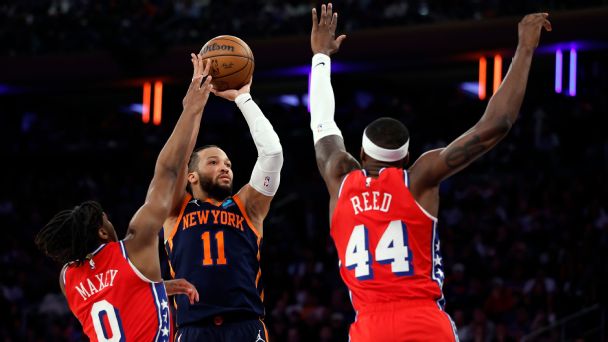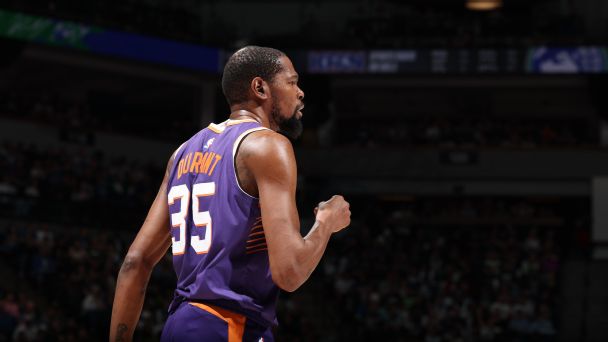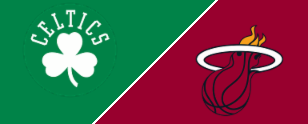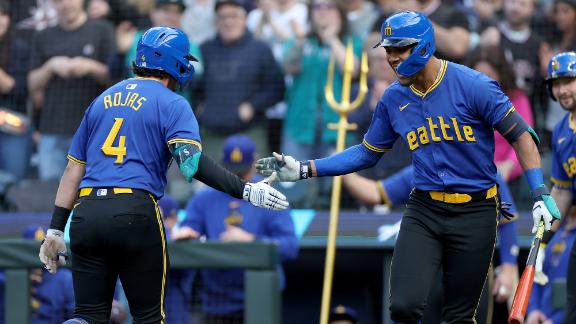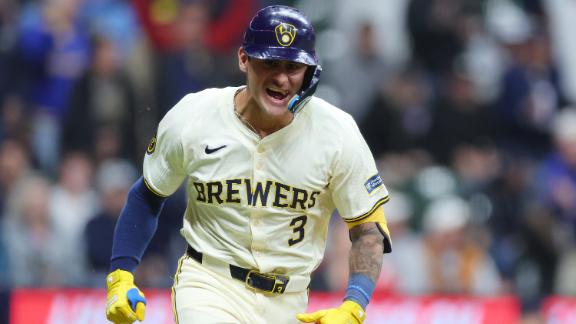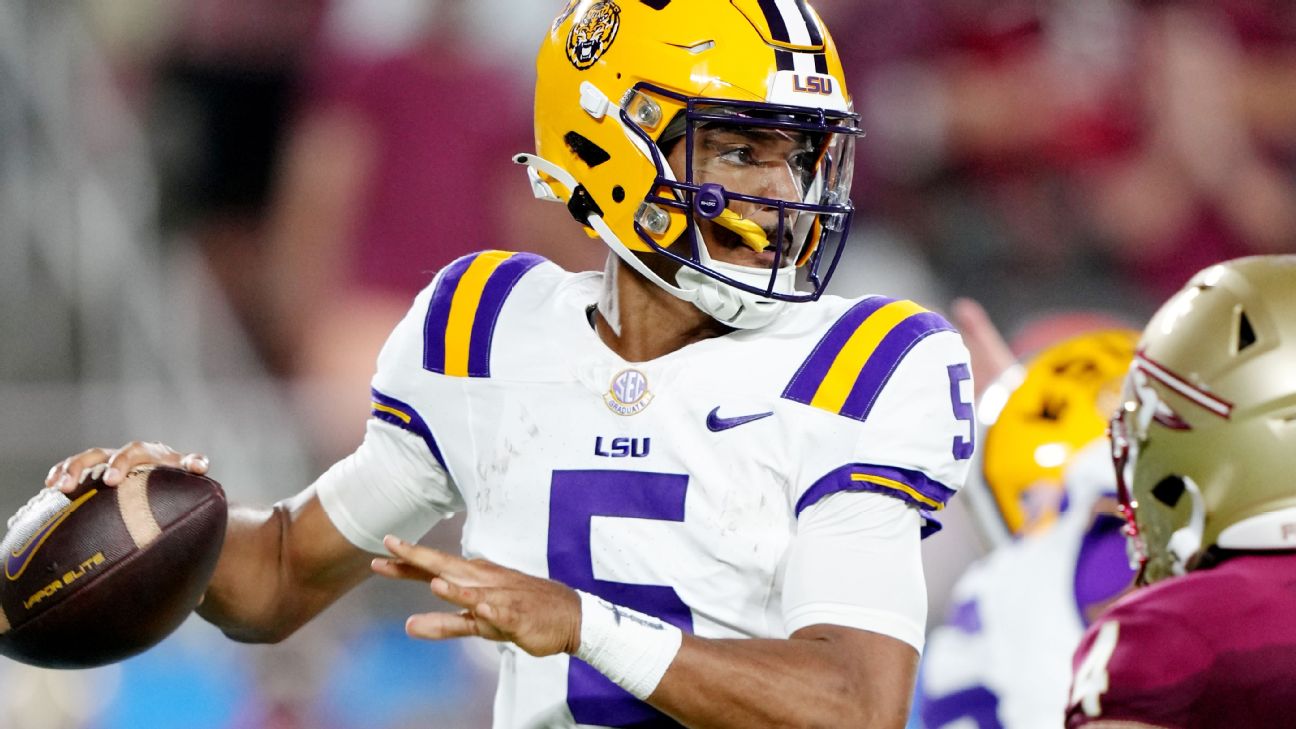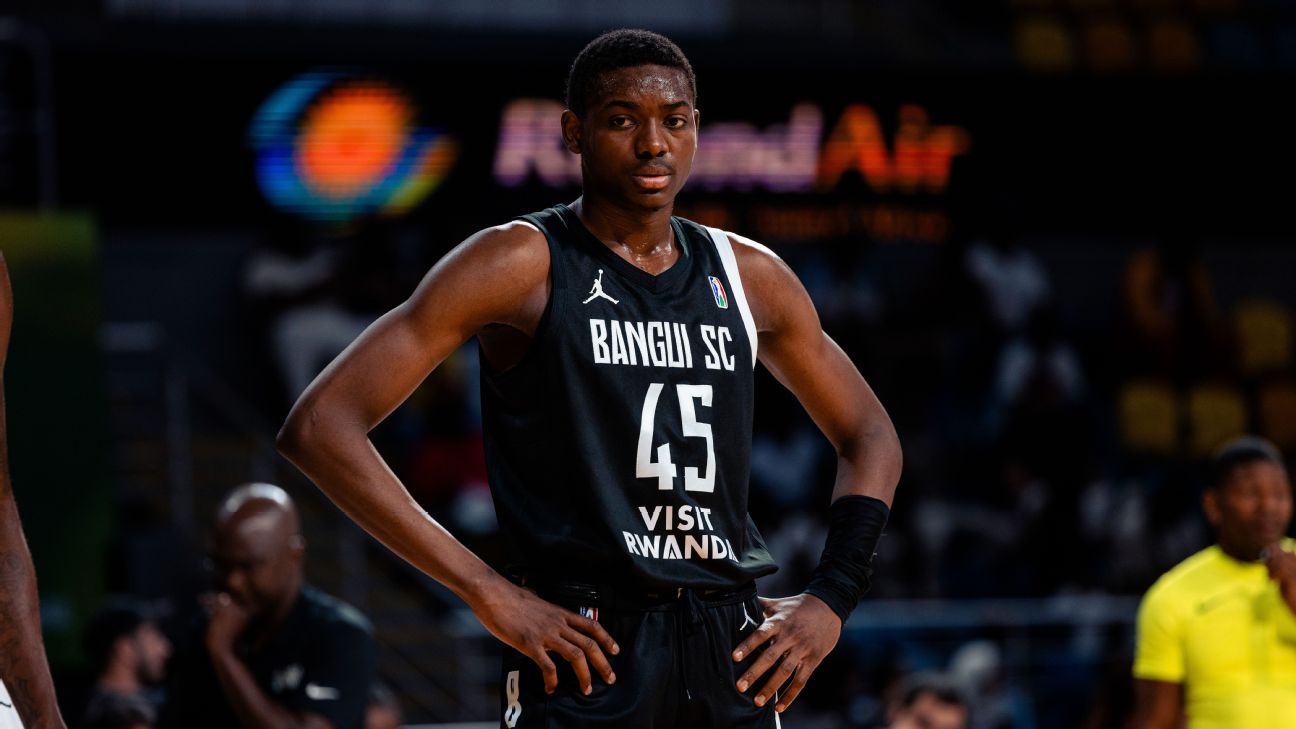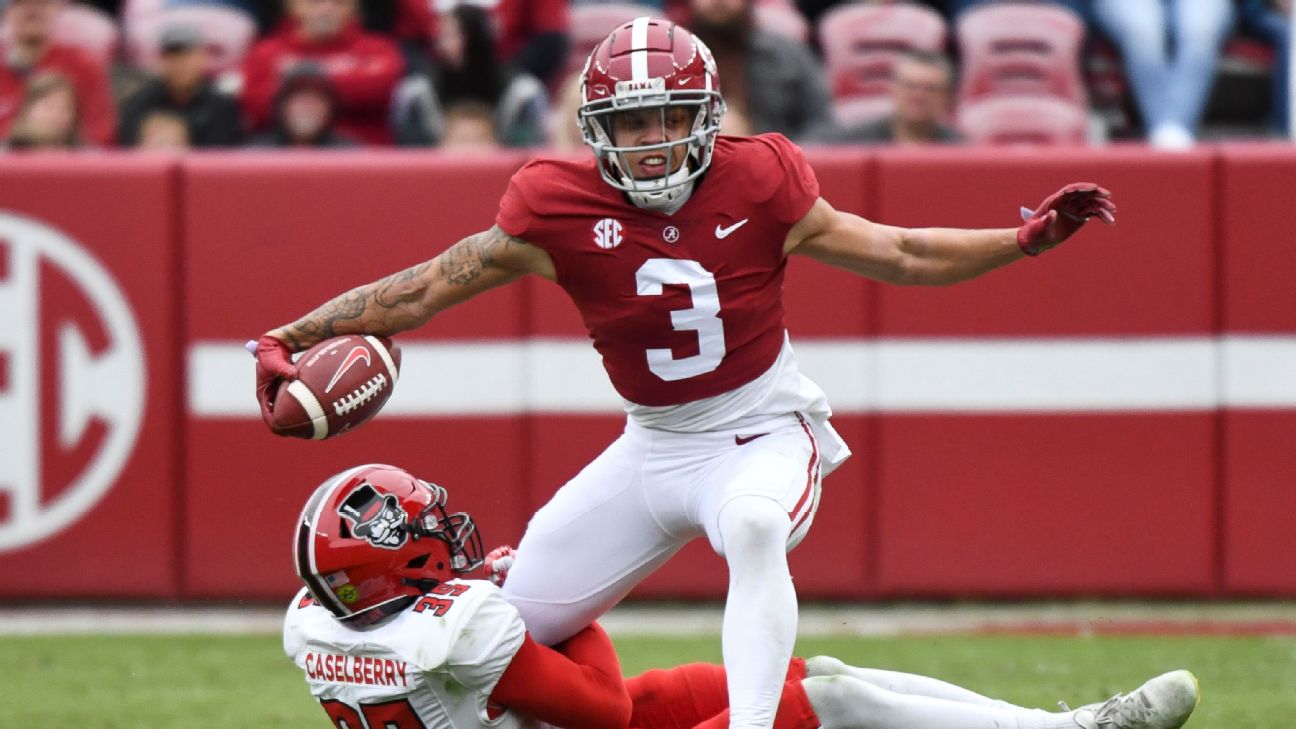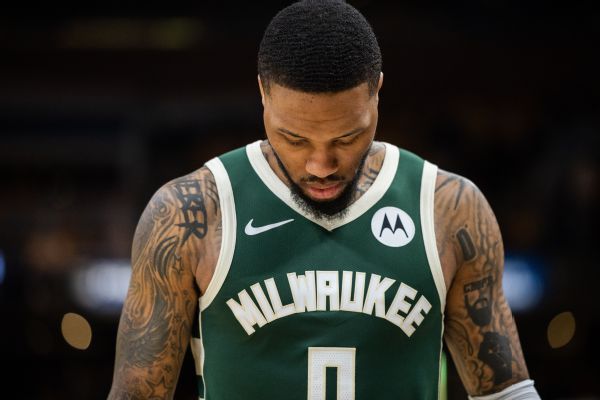![Stephen Curry #30 of the Golden State Warriors [608x342]](https://a.espncdn.com/photo/2024/0329/r1311271_608x342_16-9.jpg)
We re not going to rush his development What is the Vikings plan for preparing J J McCarthy to start
In this week's eight things I liked and disliked, we look at why the Western Conference race looks nothing like last season, the return of a healthy Khris Middleton for an inconsistent Milwaukee team, the unsung New York Knick and how the Indiana Pacers have developed a defensive (!) identity.
Jump to Lowe's Things: The wild, wild West | Will the real Bucks please stand up? Pels offense still clunky | The Pacers' identity on defense Unsung Knick | Avdija's mean streak What happened to Bryant's 3-point shooting? | "I got you that time"
1. This year's West isn't last year's WestFor at least this week, the old lions of the West rose up -- clinging to whatever is left of their championship equity within a conference shifting beneath their feet.
The LA Clippers, 10-11 in their past 21 games, fled James Harden's return game to Philadelphia in a getaway car -- heist complete. The Golden State Warriors, floundering as they attempt to fight off the turbo-charged Houston Rockets for the last play-in spot, decamped to Florida and won two straight -- surviving the latest self-imposed Draymond Green melodrama and the one-game absence of the ascendent Jonathan Kuminga. Andrew Wiggins looked as decisive in Golden State's win in Orlando on Wednesday as he has in any game since the 2022 title run.
The Warriors need that Wiggins almost every night now. Most parts of the Warriors machine are running at decent levels, but the combined effect has amounted to a 5-6 record in their past 11 games. Something is missing. On some level, it's obvious: Wiggins has been subpar all season, and Stephen Curry is shooting 39.9% since the All-Star break.
But beyond that, something seems to go haywire for some pivotal four-minute stretch every game. There is no through line. One night, it's bad transition defense -- the product, to some degree, of Golden State's strategic push this season for more offensive rebounds. The next night, the turnovers and fouls reappear. One game later, a few miscommunications on defense turn the game. They are adjusting to new lineups -- realities of a crowded rotation.
The top half of the play-in bracket is a very long shot now. The realistic goal is holding off the Rockets; Houston is fierce, and not going anywhere. In best-case scenarios the Warriors will likely need to win two games -- maybe two road games -- just to face the No. 1 seed in the first round. How much of the organization's focus is already on next season -- on reorienting the team around Curry?
The Los Angeles Lakers, one spot above the Warriors and pushing for the NBA's new consolation prize (the top half of the play-in), have won five straight and soared to a season-best nine games over .500. Their dormant offense has erupted behind the (much belatedly) revamped starting five. They gutted out perhaps the win of the season in double overtime in Milwaukee on Tuesday, with LeBron James out; Anthony Davis trudged through 52 minutes of agony, and had to sit out the Lakers' follow-up win Thursday in Memphis. They seldom win easily, but there is a proud steeliness to this Lakers team.
The Phoenix Suns, not quite an old lion but the most asset-stripped of these teams, staved off a nightmare with four wins in five games -- including a resounding road win in Denver against a Nuggets team missing Jamal Murray. The Suns defended hard, and played with a zip on offense that has too often eluded this half-baked Big Three. They jumped to No. 7, one game in the loss column behind the Dallas Mavericks. (Dallas owns the tiebreaker, as it has owned all things Suns for three seasons.) The Suns need to maintain that flow; their schedule is hell, and they are precariously close to the junior varsity half of the play-in.
They are chasing Dallas -- 9-1 in its past 10 games -- for No. 6. The Mavs have remade almost the entire roster around Luka Doncic since their conference finals run two seasons ago and yet somehow seem like the most reliable team in this group. The chemistry between Doncic and Kyrie Irving has come more easily than anyone could have expected. They have learned to play off each other in subtle ways beyond pairing up in dangerous pick-and-rolls. (And, yes, the Mavs should lean into that more.)
Irving is a master at drifting into open pockets when the defense focuses on Doncic; Doncic knows where to find him:
Irving has absorbed the funky nuances of Doncic's game -- the rhythm of his step-backs, his tendency to throw last-minute passes, the way his staccato pacing creates give-and-go chances:
Adversity will come. Perhaps it will strike tonight in a crucial game against the unknowable Sacramento Kings -- parked for now in No. 8. Win, and Dallas opens a two-game cushion over Sacramento, flips (temporarily, at least) the tiebreaker its way and boosts the Lakers' chances of stealing the No. 8 slot.
This is not your typical play-in field. Last year's No. 7 seed in the West -- the Lakers -- finished 43-39. The Mavs and Suns have already won 43 games; the Kings are at 42, the Lakers at 41. Any of them is capable of winning a round, maybe more.
It might be tempting to equate this West landscape with last season's: the juggernaut Nuggets on top, with unproven teams skeptics see as vulnerable at Nos. 2 and 3. Last season, those teams were the Memphis Grizzlies and Kings. Both lost in the first round.
This year, those teams are the Minnesota Timberwolves and precocious Oklahoma City Thunder. You understand the niggling doubts. Minnesota ranks 18th in offense and even worse in fourth quarters and crunch time. Karl-Anthony Towns is recovering from knee surgery, with a vague return date sometime early in the postseason, according to ESPN's Adrian Wojnarowski.
Aside from Shai Gilgeous-Alexander, the Thunder's core players are brand new to all of this.
But these are not last year's Grizzlies and Kings. For one, Minnesota and Oklahoma City are tied in the loss column with Denver; the No. 1 seed is in play. Both have already won 50 games; last year's Grizzlies and Kings won 51 and 48, respectively. The Thunder are plus-7.1 points per 100 possessions, the Wolves plus-6.5 -- trailing only the Boston Celtics. Last year's Kings were plus-2.6 -- eighth overall. Memphis finished plus-4.0 but entered the playoffs decimated by injuries in the frontcourt.
The Wolves are 7-3 since Towns' knee injury. Their defense, No. 1 all season, hums along -- huge and mean, with the league's apex rim protector in Rudy Gobert. Naz Reid has filled Towns' starting role admirably, the bench collective supplying Reid's sixth-man production. Anthony Edwards makes more of the right passes and cuts every game -- becoming less predictable, more dangerous.
The Thunder are unrelenting, with a poise and solidity way beyond their experience level.
The West is better at the top and in the middle. Only an early upset of Denver -- the clear favorite -- would qualify as a huge surprise. But beating teams with the statistical résumés of Minnesota and Oklahoma City -- let alone winning a second-round series -- requires a level of consistent excellence the Mavericks, Suns, Warriors, Lakers and Kings haven't shown yet.
The Clippers -- the team with the most at stake here -- compiled a 30-game dossier of such excellence. That ended six weeks ago. Injuries torpedoed their momentum, but even at full health, the Clippers are searching for some ineffable pop -- the hounding defense, just-good-enough rebounding and balance between one-on-one play and snappiness on offense. Once lost, that magic is hard to get back. If the Clippers don't rediscover it, their first-round series -- likely against the New Orleans Pelicans -- could be a toss-up.
Beating a great team four times in seven tries is the game's most daunting challenge. Doing that again and again is something only the very best can do. How many of these teams have greatness within them? Denver does. We're about to find out about the rest.
2. Welcome back Khris Middleton, and will the real Milwaukee Bucks please stand up?With no time to waste and facing title-or-bust pressure, the Bucks can finally take on their true form with Middleton healthy. He should lock everything into place. Jae Crowder becomes a useful reserve instead of an overtaxed starter. Malik Beasley has help guarding perimeter scorers. In Milwaukee's best lineups, Middleton cooks weak defenders -- with opposing stoppers battling Damian Lillard and Giannis Antetokounmpo.
The Bucks have mauled opponents by 16 points per 100 possessions with Lillard, Middleton, Antetokounmpo and Brook Lopez on the floor.
What a boon to have Middleton lurking on the second side, waiting to spring into a pick-and-roll with Antetokounmpo after someone else bends the defense. Milwaukee's foundational stars have the kind of chemistry that only comes with shared experience. Middleton is a deft lob passer:
Lillard in those moments transforms into one of the league's most dangerous spot-up options.
The Bucks are beginning to combine their three best offensive players in the same actions -- with Middleton setting off-ball screens that catapult Antetokounmpo and Lillard into their two-man game:
Middleton seizes the offense when one of Lillard and Antetokounmpo rests. (In high-stakes games, the Bucks should have two of three on the floor at almost all times.)
Antetokounmpo set 45 ball screens in the Bucks' double-overtime loss to the Lakers on Tuesday -- nine more than in any game in his career, per Second Spectrum. The Bucks are running about 24 Lillard-Antetokounmpo pick-and-rolls per 100 possessions under new coach Doc Rivers -- up from about 17 before.
If anything, the Bucks overdid it against the Lakers. Antetokounmpo didn't get enough touches in scoring positions late in the game. Milwaukee settled for too many pull-up jumpers. That's healthy. It's part of the learning curve.
The Bucks lost again Thursday in New Orleans in another shaky offensive performance. A week-plus ago, they looked like world-beaters in trouncing the Suns (without Antetokounmpo) and Thunder. Lillard's production continues to be maddeningly up and down by his standards. They are still searching for the consistent gear they will need to challenge the Celtics. (Boston is on its own two-game losing streak after quaking in crunch time for the second straight game against the Atlanta Hawks. This is a real problem.)
It's time to focus more on offense now that Rivers has plucked the low-hanging fruit in repairing the defense. The Bucks get back in transition now. Lopez is a forcefield around the rim again. Patrick Beverley fits any lineup and has kept the ball moving on offense.
The Bucks switch and blitz in strategic situations -- with Bobby Portis at the point of attack, when matchups make sense, when the shot clock dwindles -- and they are starting to make those reads in the flow. They are building habits.
That is pitch perfect. Middleton funnels D'Angelo Russell toward Lopez. Lillard rotates away from Spencer Dinwiddie to crowd Anthony Davis. Beasley splits the difference between Dinwiddie and Austin Reaves -- and toggles onto Dinwiddie when Russell slings it there. Lillard zooms out to Reaves, closing out hard without flying past him. (Lillard has played some of the best defense of his career recently.)
Milwaukee is 13-8 in its past 21 games -- tied for 11th in offense and sixth in defense in that stretch. That's good, but not quite as empathic a statement as it would want to make before the postseason.
Until the New York Knicks and Joel Embiid reach 100% health, the Bucks stand as the East team with the best chance to push Boston. There is another level they need to reach to do that. It's not that far away, but the Bucks' shortcomings defending the perimeter are more or less intractable. Late in that Lakers game, the Bucks lost containment against L.A.'s guards -- notably Reaves. Boston is an entirely different challenge -- if that series ever comes to pass.
But the actualized version of the Bucks has the firepower and resourcefulness to overcome those impediments four times in seven games against anyone.
3. The lingering moments of clunkiness in New Orleans' offenseThe Pelicans are legit -- top 10 on both ends, looking down at the play-in fray. They don't fear the starry Clippers, their likely first-round opponent, boasting a host of legends and one of the greatest postseason performers ever in Kawhi Leonard.
Zion Williamson looks like a totally different player on defense and is primed for his playoff debut.
But there are still moments of skittishness on offense between Williamson, CJ McCollum and Brandon Ingram. (Ingram is expected to miss at least another week recovering from a bone bruise in his knee.)
The Pelicans have scored only 112.5 points per 100 possessions with all three on the floor -- equivalent to the 24th-ranked team offense. Their offense sings when any combination of the two plays without the other. (Swapping in Trey Murphy III is a salve.)
Some clunkiness would disappear with time and reps. McCollum, Ingram and Williamson had barely played together before this season, and have appeared in only 42 of New Orleans' 73 games.
But some of it is baked into pairing three lead ball handlers who thrive in the same spaces and don't run enough pick-and-roll in combinations with one another. The hierarchy gets murky. They sometimes take turns with the ball, uncertain where to stand when they don't have it.
That possession starts with an Ingram-Larry Nance Jr. pick-and-roll before Ingram attacks one-on-one. Williamson, searching for something to do, cuts across the lane right as Ingram arrives there, nearly colliding with him.
The Pelicans are 11-14 in games in which the score was within five points in the last five minutes and 27th in points per possession in those segments.
The sample is small. Statistical blips masquerade as calcified trends right until the moment they flip. Most teams get slower and stickier on offense late in close games. (Ask the Celtics.) The Pelicans' stars are explosive enough to thrive in tight spacing; Williamson can blast through thickets of bodies.
But coach Willie Green has to manage this carefully, and maybe make some tough decisions. He tends to focus those choices on the team's centers, occasionally starting Nance over Jonas Valanciunas in second halves -- exchanging one slower, ball-dominant interior scorer with a pass-first big who flits around.
This team is loaded with talent and extra draft picks, but the tests never stop.
4. The Indiana Pacers, developing a defensive identityIf Tyrese Haliburton can climb closer to his early-season supernova form, the Pacers will be a dangerous first-round opponent -- presuming they avoid Boston. For now, the Pacers sit in the No. 6 spot. The candidates jostling for No. 3 -- the Knicks, Cleveland Cavaliers and Orlando Magic -- face questions of health or experience.
Should they fall to No. 7, the Pacers would likely draw their rival in game-ball acquisition -- Milwaukee; Indiana is 4-1 against the Bucks and enjoys tormenting an incumbent East powerhouse. The Bucks seem irritated by the bravado of these would-be usurpers.
Indiana has been a scoring machine all season. It is starting to form a defensive identity built on speed, size and versatility. The Pacers rank 16th in points allowed per possession since early March. That doesn't sound like much, but it's a sea change given Indiana spent the prior months near the basement.
They have to sustain it. Their March schedule has leaned toward below-average scoring teams. Their opponents have hit just 34.7% on 3s since March 5 -- fifth lowest.
But something is happening here, and it has a lot to do with Indiana giving more minutes to plus defenders -- Pascal Siakam, Andrew Nembhard, T.J. McConnell, Aaron Nesmith, Ben Sheppard. Siakam has defended all manner of bigs and wings, unlocking some new switchability.
With perimeter defenders doing a better job staying attached, Myles Turner has ratcheted up his rim protection. Jalen Smith, Turner's primary backup, is playing the best two-way ball of his career; he can toggle between drop-back defense and in-your-grill switching.
Opposing offenses didn't feel the Pacers before. They do now -- at times. The Pacers are handsy, in a stance, rotating with purpose:
You rarely see Draymond Green suffer any indecision in this situation. He is usually the one baiting defenders, outguessing them.
The Pacers impose indecision on him here. Nesmith chases Klay Thompson around Green's pin-down. Turner lunges from Green to deter any Thompson jumper or drive, but does not stray too far. Siakam rotates from Jonathan Kuminga along the baseline but stops short of swarming Green. Is the lob to Kuminga there -- the one Green has made hundreds of times? Or should Green shoot?
He doesn't seem to know until it's too late.
Keep an eye on the Pacers.
5. Isaiah Hartenstein, unsung hero (Part 2)Hartenstein has been a revelation replacing Mitchell Robinson in the New York Knicks' starting five -- tireless, pointy-elbowed, reveling in the grimy parts of the game from which some players recede. He should be at least a fringe candidate for one of the All-Defensive teams.
Hartenstein has always been a good passer and voracious offensive rebounder; he is second in offensive rebounding rate, behind only Clint Capela. But in a larger role for an injury-riddled (and tough as hell) team, Hartenstein has shown glimpses of a broader skill set -- including the ability to create offense in a pinch:
Hartenstein has recorded only 28 combined isolations and post touches, but the Knicks have scored about 1.4 points directly out of those plays, per Second Spectrum -- a gargantuan number. Hartenstein is shooting 52% from floater range. The Knicks have blitzed opponents by 9.5 points per 100 possessions with Hartenstein on the floor -- the fattest figure among all New York rotation players, save OG Anunoby.
Hartenstein is an unrestricted free agent this summer and has earned a raise. Without him, the Knicks might be fighting to stay above the play-in.
6. Deni Avdija's mean streakAnd now we pause to say something nice about a bad team we will soon wipe from our memories: Amid the Washington Wizards' endless losing, Avdija has emerged as a very good player -- tougher and more decisive than he was a year ago.
Since Feb. 1, Avdija is averaging 18.7 points on 52.4% shooting -- including 41% on 3s. Avdija is shooting more 3s too -- not enough considering he's approaching 40% accuracy, but he at least seems to have overcome the yippy hesitation that has infected his game off and on.
He's getting to the line about 4.5 times per game, up from 2.9 before that. Avdija is finally attacking as if he understands he is 6-foot-9 and pretty strong.
If he spots smaller players ahead of him in transition, Avdija plows through them:
He has the same nasty streak in the half court, both in attacking closeouts and running pick-and-rolls:
That ghost screen from Jared Butler gets Harrison Barnes to shift his weight the wrong way for a half-second. That's all the runway Avdija needs. Avdija is averaging 13.5 drives per 100 possessions, blowing away his previous high of 8.9, per Second Spectrum.
Avdija has always been a stout defender and rebounder. He's barely 23. Avdija is about to cycle onto a four-year, $55 million extension -- one that starts with an annual salary of $15.6 million and declines to $11.875 million in Year 4. He's ultra-valuable on that contract.
7. What happened to Thomas Bryant's 3-point shooting?A mildly surprising statement in 2024: Among their armada of injured players, the Miami Heat really miss Kevin Love.
Love has been by far Miami's best backup to Bam Adebayo and can play spot minutes alongside him. The Heat -- a mere plus-29 overall -- have outscored opponents by almost six points per 100 possessions with Love on the floor. Love remains an elite rebounder, outlet passer and ball mover in the half-court. He has enough feel to hang in on defense.
You'd be forgiven for remembering nothing of the Wizards' 1-7 stint in the bubble during summer 2020. A thing that happened there: Bryant shot 15-of-37 on 3s and looked to be developing into a stretch center.
Bryant tore an ACL in January 2021 and has not found his stroke since. The Heat still station Bryant in the corners, but defenses aren't paying him any attention there; Bryant is 3-of-18 on 3s.
The Heat are starved for points. They rank 23rd in points per possession and haven't scored all that well in the (limited) minutes they've had their best players available together. They trail the Pacers for the coveted No. 6 spot.
The Heat have earned the right to dismiss seeding, sneering at the supposed danger of the play-in. But chance single-elimination year after year, and you will eventually lose before the real playoffs start.
Miami has the league's easiest remaining schedule. The Heat and Pacers play once more -- April 7 in Indiana -- in a game that will decide the head-to-head tiebreaker. Watching closely: the Celtics, who could face the loser of a Heat-Sixers play-in game in the first round.
8. An affectionate 'I got you that time'I loved this moment during Golden State's win in Orlando on Wednesday:
Gary Payton II loses Franz Wagner on a sneaky baseline cut, dunks and passes a sulking Wagner trotting to the other end. Payton gives Wagner a little tap on the hip that seems to say, "Yeah, I got you that time."
This small gesture works on so many levels. It could be patronizing -- almost like Pau Gasol patting Chris Paul on the head a decade-plus ago: Don't be so gullible. Here, it seems almost empathetic: It happens. You'll do better next time.



